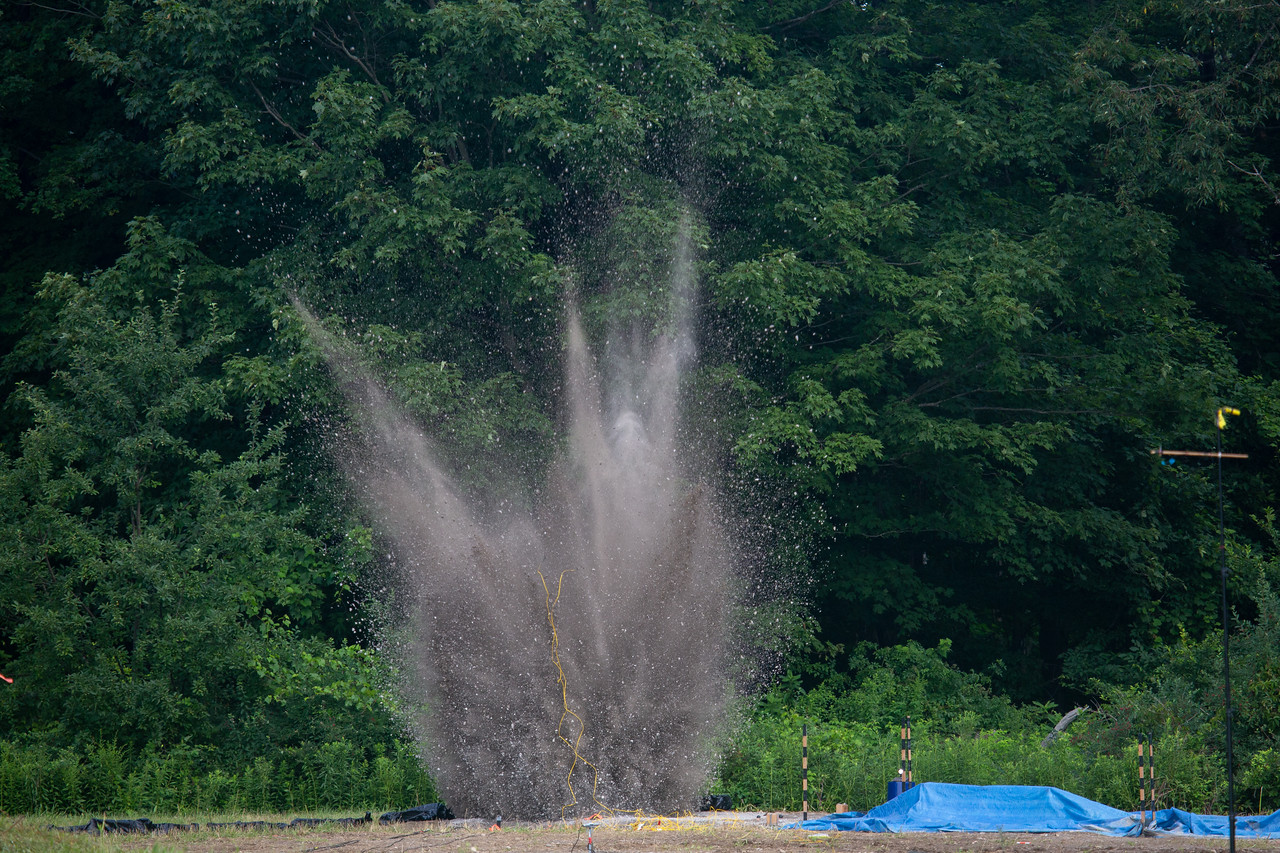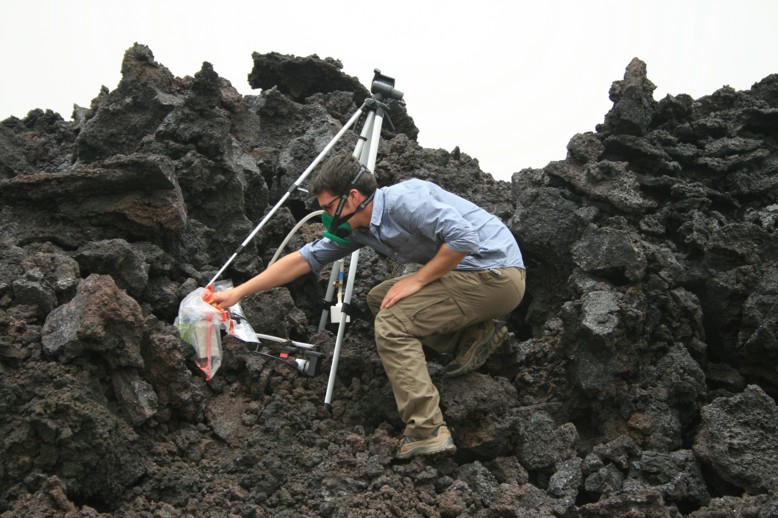Volcanology
Volcanology Research ESS in the News. Relentless Rain Triggers Landslides; More Rain and Risk on the Way KIRO 7 Days of heavy rain in Western Washington has communities on high alert. Storms have already triggered small landslides, and geologists say conditions are ripe for the next storm. USF volcanology is contributing to a new National Academy of Sciences panel on the state of volcano science in the US. Chuck Connor is working on the report, and Steve McNutt is liaison to the committee from the NAS crustal geodynamics group.
Volcanology, also spelled vulcanology, discipline of the geologic sciences that is concerned with all aspects of volcanic phenomena. Volcanology Lyrics: Go on a date / I've seen her face a million times / I know I'm late / But the devil can wait with a pretty smile / With an emptied moon / If I'm loud enough I might be understood.

A volcanologist or vulcanologist is a geologist who studies the processes involved in the formation and eruptive activity of volcanoes and their current and historic eruptions, known as volcanology. Volcanologists frequently visit volcanoes, especially active ones, to observe volcanic eruptions, collect eruptive products including tephra (such as ash or pumice), rock and lava samples. One major focus of inquiry is the prediction of eruptions; there is currently no accurate way to do this, but predicting eruptions could alleviate the impact on surrounding populations.
Etymology[edit]
'Volcanologist' (or Vulcanologist) was derived from the English volcanology (volcano + -logy), which was derived from the French volcanologie (or vulcanologie), which was further derived from the French word volcan (“volcano”), which was even further derived from Vulcanus, the Latin name of the Roman god of fire and metalworking. The Latin word is of Estrucan origin, but unknown meaning.
Job Overview[edit]
Job description[edit]
Volcanologists attempt to decipher what clues rocks leave behind about the inner workings and chemistry of the earth. While there are many exciting aspects to a volcanologist career, most assignments study the remains of either dead or dormant volcanoes.
Salary[edit]
Volcanologists earn an average of $90,890 per year, with the highest 10% earning around $187,200 and the lowest 10% earning around $48,270. Most of these scientists work for different levels of government, universities, and private research institutes.
Work environment[edit]
Typically, Volcanologists split their workdays between conducting fieldwork and working in a laboratory. During fieldwork, scientists may be required to venture to exotic or isolated locations where active or dormant volcanoes reside. They must collect various samples and data, generally in an outdoor area. Those hoping to become a Volcanologist must be prepared to travel, spend extended periods of time away from home, perform strenuous physical activities, and brave adverse weather conditions. Once they have finished collecting samples, they return to their laboratory to analyze their data. They then must communicate their findings to a group of scientists. Volcanologists employed by universities may also be required to spend time in a classroom environment.
Volcanology Definition
Most of these scientists work full-time and may be required to work extended hours when performing fieldwork, which is quite frequent.
Job outlook[edit]
The job demand for Volcanologists is expected to grow 16% in the next 10 years, which is faster than the average profession.[citation needed] The public's increasing interest in environmental protection, safety, and management will spur the upcoming growth in positions.
Education[edit]
Volcanologists require a bachelor's degree at minimum in geology, geophysics, or earth science. However, a bachelor's degree typically provides little specialized knowledge of volcanoes and will only allow someone to obtain an entry-level position in the field. Most Volcanologists possess either a master's or doctorate degree, allowing them to acquire more advanced knowledge of volcanoes specifically. Those wishing to be employed by universities or seek academic funding would be well served by earning a Ph.D.
In some areas, becoming a Volcanologist that predicts the eruption of volcanoes may require a special license.

Interdisciplinary fields[edit]
History[edit]
See: Volcanology
Current and developing research topics[edit]
Notable volcanologists[edit]
- Plato (428–348 BC)
- Pliny the Elder (23–79 AD)
- Pliny the Younger (61 – c. 113 AD)
- George-Louis Leclerc, Comte de Buffon (1707–1788)
- James Hutton (1726–1797)
- Déodat Gratet de Dolomieu (1750–1801)
- George Julius Poulett Scrope (1797–1876)
- Giuseppe Mercalli (1850–1914)
- Alfred Lacroix (1863–1948)
- Frank A. Perret (1867–1943)
- Thomas Jaggar (1871–1953), founder of the Hawaiian Volcano Observatory
- Alfred Rittmann (1893–1980)
- Sigurður Þórarinsson (1912–1983),
- Haroun Tazieff (1914–1998), advisor to the French Government and Jacques Cousteau
- George P. L. Walker (1926–2005), pioneering volcanologist who transformed the subject into a quantitative science
- Haraldur Sigurdsson (1939-), Icelandic volcanologist and geochemist
- Katia and Maurice Krafft (1942–1991 and 1946–1991, respectively), died at Mount Unzen in Japan, 1991
- Peter Francis (1944–1999)
- Keith Rowley (born 1949; Prime Minister of Trinidad and Tobago since 2015)
- David A. Johnston (1949–1980), killed during the 1980 eruption of Mount St. Helens
- Bill McGuire (born 1954)
- Harry Glicken (1958–1991), died at Mount Unzen in Japan from dangerous gases, 1991
See also[edit]
External links[edit]
Hello folks and thanks so much for listening to the first episode of Ologies with the supremely badass volcanologist and congressional candidate, Jess Phoenix. Y'ALL WE DID IT THIS IS FINALLY A PODCAST THAT EXISTS.
Structural Geology
Listen on Stitcher, iTunes, Omny, Spotify or wherever you get podcasts.
Before I get to the links, a clarification:
So, if you subscribed in advance (thank you so facking much!), you may have gotten a version of the show that was not intended to go out. It's a rough rough edit done a few months ago, before the sound was really mixed, before my narration was added and before the show had a format. I'm so sorry. I am mortified because I'd worked literally months on the new version with sound effects, my V.O. and a much tighter conversation. My network uploaded the wrong file in the middle of the night and I didn't know until it was after noon on the East Coast.
So I'm sorry I had to make so many frantic announcements via social media ('Hey hi I'm Alie and I'm not wearing any makeup and I'm about to cry please delete my podcast!') but I really fucking love my listeners and you deserve the best: a show that has the right balance of science and warmth and humor and is professionally done. Putting out the wrong version was my own little mini-nightmare but... [SHRUG EMOJI].
If you got the wrong version, you'll know because it had no narrated bits throughout. If you got the RIGHT one, you'll know what was in my family's earthquake kit growing up and how I feel about awkwardly misogynistic volcano romance. Okay.
So if you got the wrong one, delete and redownload and pretend it's all fresh. Whatever.
If you liked it, I'd love it if you rated/reviewed/subscribed on iTunes or wherever you obtain thine podcasts. And/or tell your friends about the podcast. If you feel so inclined, become one of my first pals on Patreon. I'm considering making creepy shoulder massages a perk, but maybe that's a bad idea and I should just make Ologies keychains. Let me know what rewards you'd want in the comments below OR by becoming a Patron and posting on the page. I want to keep making the best quality episodes without a bunch of annoying ads, and I hope there are enough of us to make that possible.
Okay, onto the links!
Become a patron on Patreon. I might send you things in the mail.
Theme song by Nick Thorburn.

Mauna Loa ('It's long. It's really really looooong.')
Video of Mt. St. Helens 'projectile vomiting'
Earthquake kit instructions (ahem, California and Pacific Northwest)

Volcanology News
'Subduction leads to orogeny' items
Volcanologist
Pixar's Lava short [heavy sigh]
.jpg/revision/latest/scale-to-width-down/340?cb=20111024074428)
Volcanology
Browse some volunteer research positions, for fack's sake! It could change your life.
Thanks so much and stay tuned for hot zookeeper gossip next week. I love you.